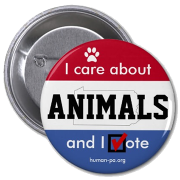Guest Blog by Amy Worden
In July 2008, two Berks County kennel owners were ordered by state dog wardens to treat their infested dogs for fleas. Instead the breeders took their shotguns and opened fire on their dogs as they cowered in their rabbit hutches. In the end, the bodies of more than 80 small lap dogs – poodles, shih tzus, cocker spaniels – were exhumed from a compost pile.
What Elmer Zimmerman and his brother Ammon Zimmerman did was perfectly legal under Pennsylvania law. The animal-loving world was horrified. How could someone commit an act of such astonishing cruelty?
The little dogs did not die in vain. The massacre was the turning point in a two-year-long battle to improve the care of dogs breeding kennels in Pennsylvania.
battle to improve the care of dogs breeding kennels in Pennsylvania.
These two men, licensed kennel operators, were so consumed with profit and so enraged at being told to obtain the treatment their dogs needed, that they systematically killed the source of their “cash crop” – the hundreds of puppies they sold each year.
That gruesome act underscored the need for change in the law and today, the tenth anniversary of the signing of the historic “puppy mill” bill by Governor Ed Rendell, we reflect on the journey.
During the spring of 2008, pet-friendly law makers, Rendell’s staff and animal advocates strategized on how to push through an overhaul to the state’s kennel law before the end of the legislative session in October.
The bill (HB 2525) would be the first change to Pennsylvania dog law in 25 years.
The bill did not exactly sail through the House Agricultural and Rural Affairs committee, passing on June 26 by a 17-12 vote. Dog breeders were marshalling their allies to defeat the bill. It would be a fight to the session’s end.
The struggle to transform Pennsylvania from a state that had long protected dog breeders over the humane treatment of animals was hardly an easy sell. Most breeders were farmers and the mission of the Department of Agriculture, which regulated kennels was, and still is, to protect farmers and the state’s number one industry: agriculture.
But the welfare of dogs was far more than a political cause for the governor; it was personal. Rendell had rescued several Golden Retrievers from Lancaster County puppy mills. He saw the toll of a life locked in a cramped rabbit hutch, standing on paw-destroying wire mesh, never touching the ground or being tenderly touched by a human, could take on their bodies and their spirits.
In January 2006, at the urging of his friend, ASPCA board member Marsha Perelman, Rendell called a meeting with Perelman and Bill Smith, founder of Main Line Animal Rescue. Smith could relay the horrors of puppy mills first hand, since he devoted himself to coaxing breeders to give up their “spent” breeding dogs, their puppies too old to sell and those with serious medical issues. Perelman brought her leadership skills to the table and passionate advocacy for animals as she guided the legislation forward.
That March Rendell took his first dramatic step to turn the tide on Pennsylvania puppy mills: He fired the entire Dog Law Advisory Board, which was formed to counsel governors on kennel issues. At that time one of the most notorious puppy mill operators – someone who had 800 dogs in his kennel – was one of the “advisors.”
I covered every twist and heated turn from that point forward as a state government reporter for The Philadelphia Inquirer.
At the first of several contentious hearings, 300 breeders – mostly Amish and Mennonite – packed a large meeting room at the Farm Show building. They were farmers, they said, who knew how to care for animals. Their lobbyists tried to make the outrageous case that only happy dogs would breed.
The breeders argued they couldn’t afford to upgrade their kennels, that new requirements for light, temperature, air flow and exercise, would put them out of business.
The breeders were joined in their opposition to the bill by the American Kennel Club, the Pennsylvania Farm Bureau, various sporting dog groups and, most surprisingly, the Pennsylvania Veterinary Medical Association.
Statewide animal activists, supported by the lobbying and outreach muscle of the Humane Society of the United States and the ASPCA, were drawing local national and global attention to the appalling conditions that gave the state the embarrassing moniker, “puppy mill capital of the East.”
Bill Smith launched an anti-puppy mill billboard campaign on the Pennsylvania Turnpike, before erecting a billboard in a strategic location in Chicago that caught Oprah Winfrey’s attention. She dispatched a TV crew to follow Smith through kennel country and reporter Lisa Ling’s dramatic piece that aired in April, brought to the screens of millions of viewers the gruesome reality behind Pennsylvania’s kennel doors.
The combination of the Oprah piece and the revelation of the mass shooting of the kennel dogs was a wake up call to some lawmakers who may have thought puppy mill conditions were exaggerated by activists.
Still, when lawmakers returned in September opponents tried a new tack, trying to drown the bill with scores of amendments. One barred the housing of a dog in a dishwasher. mocking one of Smith’s eye-catching billboards showing a beagle in a dishwasher – the same dimensions of a legal kennel cage size in Pennsylvania.
On September 17, the House of Representatives passed the bill, 181-17. I was on my dream vacation – a transatlantic cruise. I filed a story from somewhere in the Atlantic Ocean.
But it wasn’t over yet.
The debate dragged on to the final session day of the state Senate and into the night of October 8. The PVMA argued that members of the legislature were unqualified to determine standards for dogs in kennels.
Finally, in a packed Senate meeting room a compromise was reached and language to form the Canine Health Board was inserted. The board would be comprised of veterinarians to determine specifications for new kennels and appropriate temperatures, ammonia levels and ventilation to be signed off on by an engineer. The bill passed 49-1.
Rendell quickly signed the bill the next day to ensure the clock would start on the new regulations taking effect. Among them was a provision that only a veterinarian may euthanize dogs in commercial kennels. He would hold a ceremonial signing in Bucks County on October 29.
“We, the dog lovers decided that Pennsylvania’s time had come to end being the puppy mill of the east, and we did that in a way that will transform us from being the puppy mill of the east to being one of the best states that has protection for dogs,” Rendell told onlookers that day.
The new law established that any kennel selling or transferring more than 60 dogs had to double cage sizes, eliminate wire flooring, and provide unfettered access to the outdoors. The new law also banned cage stacking, mandated twice-a-year veterinary exams for breeding dogs, and established new lighting, ventilation and temperature standards.
Act 119 was at the time, and remains, the strictest kennel law in the nation and has served as a model for legislation in other large dog breeding states, including Missouri and most recently, Ohio.
Breeders did not surrender quietly. They unsuccessfully sued to stop the bill’s implementation. The Animal Legal Defense Fund also sued over the law and won, successfully arguing that an exemption to allow wire flooring for mother dogs and puppies up to 12 weeks violated the law.
 In July 2017, I watched Gov. Wolf sign Libre’s Law, the most sweeping animal legislation in the history of the Commonwealth. Hundreds of people and dozens of dogs crowded the green outside the Capitol for the celebration, as Libre, a puppy mill survivor and the bill’s namesake, left his paw print on the bill.
In July 2017, I watched Gov. Wolf sign Libre’s Law, the most sweeping animal legislation in the history of the Commonwealth. Hundreds of people and dozens of dogs crowded the green outside the Capitol for the celebration, as Libre, a puppy mill survivor and the bill’s namesake, left his paw print on the bill.
How far we’ve come.
Animals are no longer a “fringe” issue in Harrisburg.
Lawmakers of both parties today compete for most animal friendly status. They post photo ops with Libre, selfies with their own dogs across social media platforms and vie for humane group endorsements.
But puppy mills did not disappear from the Pennsylvania landscape. While the numbers of commercial kennels plummeted from 300 to about 30 following the passage of the bill, that number has crept back up to almost 90. Many kennels dropped below the 60 dog-sale-or-transfer threshold to skirt the new law.
Since non-commercial kennels do not have to comply with the same standards as commercial kennels, dogs in hundreds of small licensed kennels still stand on wire and endure sweltering heat and frigid cold in rabbit hutches.
The retail pet sales bill, which recently passed the Senate Judiciary Committee, is a perfect book end ten years out from the passage of the puppy mill bill.
Legislation to halt the sale of commercially-bred puppies in pet stores will curb breeding, not only in Pennsylvania, but other states which supply Pennsylvania pet stores.
In 2008 the notion of simply improving conditions for dogs in breeding kennels in Pennsylvania was considered controversial. Now lawmakers are considering legislation to establish rehoming and adoption as the standard for the state.
Ten years ago, many lawmakers stood their ground with dog breeders seeking to protect the status quo of substandard care, weak regulations and little enforcement. Today those in positions of power not only recognize but embrace the idea that pets are part of the human family.
There were too many people involved in winning passage of the puppy mill bill to list, but some deserve special recognition, especially two who are no longer with us. As members of Gov. Rendell’s newly reconstituted Dog Law advisory Board, the late Tom Hickey and the late Patti Bednarik were instrumental in the bill’s passage. Bob Baker, an animal welfare investigator with the ASPCA, Libby Williams, founder of NJ Consumers Against Pet Shop Abuse and Sue West, a board member of the Lancaster Humane, were among the first to raise the issue of puppy mill conditions with government officials long before Gov. Rendell took office.
#####



